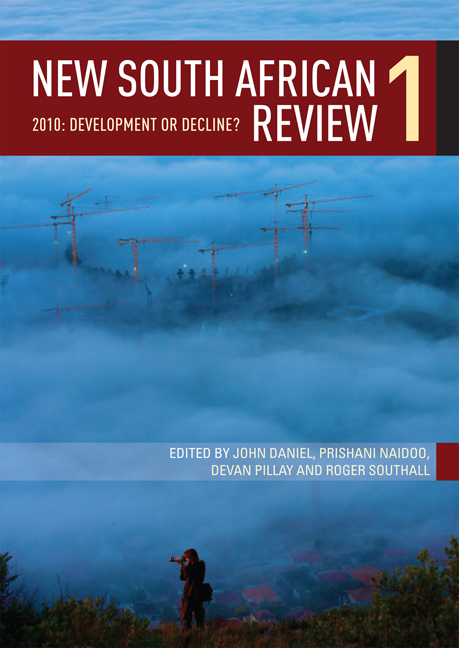Book contents
- Frontmatter
- Contents
- Preface
- Introduction South Africa 2010: From short-term success to long-term decline?
- PART 1 ECONOMY, ECOLOGY AND SUSTAINABILITY
- PART 2 STATE, POLITICS AND POLICY
- PART 3 EDUCATION, HEALTH AND LAND
- INTRODUCTION Reform and redress in higher education, health and land
- CHAPTER 11 ‘Silencing and worse …‘: The humanities and social sciences in South Africa
- CHAPTER 12 Realising transformation, equity and social justice in higher education
- CHAPTER 13 The polarising impact of South Africa's AIDS epidemic
- CHAPTER 14 Health for all? Towards a national health service in South Africa
- CHAPTER 15 The Comprehensive Rural Development Programme (CRDP): A beacon of growth for rural South Africa?
- CHAPTER 16 Breaking down barriers: Policy gaps and new options in South African land reform
- PART 4 Doreen Atkinson
- Contributors
- Index
CHAPTER 15 - The Comprehensive Rural Development Programme (CRDP): A beacon of growth for rural South Africa?
from PART 3 - EDUCATION, HEALTH AND LAND
Published online by Cambridge University Press: 21 April 2018
- Frontmatter
- Contents
- Preface
- Introduction South Africa 2010: From short-term success to long-term decline?
- PART 1 ECONOMY, ECOLOGY AND SUSTAINABILITY
- PART 2 STATE, POLITICS AND POLICY
- PART 3 EDUCATION, HEALTH AND LAND
- INTRODUCTION Reform and redress in higher education, health and land
- CHAPTER 11 ‘Silencing and worse …‘: The humanities and social sciences in South Africa
- CHAPTER 12 Realising transformation, equity and social justice in higher education
- CHAPTER 13 The polarising impact of South Africa's AIDS epidemic
- CHAPTER 14 Health for all? Towards a national health service in South Africa
- CHAPTER 15 The Comprehensive Rural Development Programme (CRDP): A beacon of growth for rural South Africa?
- CHAPTER 16 Breaking down barriers: Policy gaps and new options in South African land reform
- PART 4 Doreen Atkinson
- Contributors
- Index
Summary
This chapter discusses two key interrelated themes underpinning South Africa's renewed attempt to develop and implement a Comprehensive Rural Development Programme (CRDP). First, a brief outline of the CRDP programme is presented, inclusive of its three subprogrammes agrarian reform, land reform and rural development, as well as a discussion of its institutional framework. Second, an evaluation of the CDRP is offered against the backdrop of international experiences with rural development (notably the changing paradigms of rural development from the 1950s to the present and the lessons thereof) and South Africa's own experiences with rural development. Finally the customary challenges facing South Africa's land question as one of the key pillars of the CRDP programme are examined. These three levels of discussion are used to question some of the underlying assumptions the CRDP makes about rural development.
The cardinal argument made here is that notwithstanding the institutional, legislative and fiscal limitations that will encumber the CRDP, one of the primary challenges is to rehabilitate failed land reform projects and to institute reforms that will generate viable sustainable livelihood outcomes to augment the broad developmental mandate of the programme. It is proposed that the CRDP potentially heralds a beacon of growth for rural South Africa despite the fragility of the socio-economic and institutional milieu in which it is embedded.
THE COMPREHENSIVE RURAL DEVELOPMENT PROGRAMME
The CRDP framework document sees rural development as a process ‘…enabling rural people to take control of their destiny, thereby dealing effectively with rural poverty through the optimal use and management of natural resources’ (DRDLR 2009: 4).
The envisaged outcome of the process is the creation of ‘vibrant, equitable and sustainable rural communities’ (DRDLR 2009: 3). Four key outcomes are proposed: sustainable land reform, food security, rural development and job creation linked to skills training and development. A range of complex and often overlapping distinctions are made with regard to the distinction between a ‘vibrant’ and ‘sustainable’ community (DRDLR 2009: 10) in terms of expected outcomes envisaged in rural communities. Each of six such distinctions demarcates what constitutes ‘vibrance’ and ‘sustainability’ in the targeted communities. For instance, one of the key featuresof a vibrant community is ‘a high work ethic and industrious character’. Achieving sustainability in this regard will entail promoting ‘a savings and investment culture’ (ibid).
- Type
- Chapter
- Information
- New South African Review2010: Development or Decline?, pp. 344 - 363Publisher: Wits University PressPrint publication year: 2010



